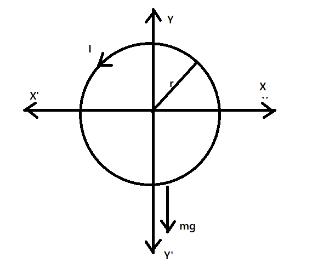Question
Question: A rigid circular loop of radius \( r \) and mass \( m \) lies in the \( x - y \) plane on a flat tab...
A rigid circular loop of radius r and mass m lies in the x−y plane on a flat table and a current I flowing in it. At this particular place, the magnetic field is B=Bxi^+Byj^ . How large I be so that one edge of the loop will lift from the table.
Given m=1kg , r=1m , Bx=3T and By=4T .
(A) π2A
(B) 2πA
(C) 3π10A
(D) πA
Solution
To solve this question we consider the given condition in which the wire is placed on the x−y plane and current is flowing through them and the magnetic field is also acting on it. Hence we first evaluate the magnetic moment using the given parameters and then by using the magnetic field and magnetic moment we will find the current flow when one edge of the loop will lift from the table.
Formula used:
Force τI acting due to the electric field can be given as
⇒τI=M×B
Where M is the magnetic moment and B is the magnetic field.
The magnetic moment of a substance
⇒M=I×A
Where I is the component of current and A is area.
Complete Step-by-step solution
Here given that the circular rigid wire is placed on the x−y plane having radius r and mass m and the current I is passing through it. The wire is lifted by its one end from the table. The diagram of this arrangement is given as

Hence from the diagram, it can be evaluated that when the wire is lifted from the table from its one end then a force mg is acting on the other end in the downward direction which can be given as τI
⇒τI=M×B ………. (1)
Where M is the magnetic moment and B is the magnetic field.
The magnetic moment of a substance can be evaluated as
⇒M=I×Ak^ ……… (2)
Now the area of the circular loop is given as
⇒A=πr2 ……… (3)
Substitute the values of the equation (2) and (3) in the equation (1) , hence
\Rightarrow \overrightarrow {{\tau _I}} = \left\\{ {\pi {r^2}I\hat k} \right\\} \times {B_x}\hat i + {B_y}\hat j
\Rightarrow \overrightarrow {{\tau _I}} = \left| {\begin{array}{*{20}{c}}
{\hat i}&{\hat j}&{\hat k} \\\
0&0&{\pi {r^2}I} \\\
{{B_x}}&{By}&0
\end{array}} \right|
Hence evaluating the determinant of the matrix we get
⇒τI=i^(0−ByIπr2)−j^(0−BxIπr2)
⇒τI=Iπr2(j^Bx−i^By)
Now evaluating the magnitude of the current
⇒τI=Iπr2Bx2+By2
⇒mg=Iπr2Bx2+By2
Upon rearranging the equation we get,
⇒I=πr2Bx2+By2mg
Substituting the values of r=1m , Bx=3T and By=4T , and m=1kg
⇒I=π(1)2(3)2+(4)21×10
∴I=π2A
Hence the electric current acting when one edge of the loop will lift from the table is I=π2A .
Therefore option (A) is the correct answer.
Note
While dealing with vector quantities always ensure the direction of the components given. In this question for multiplication, we have used the matrix representation of the quantities. Also, ensure to use the correct units while dealing with a large number of parameters.
